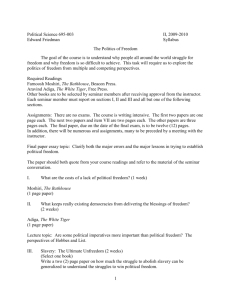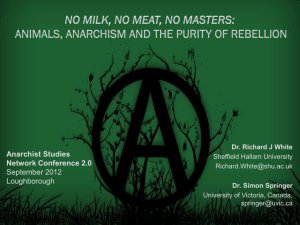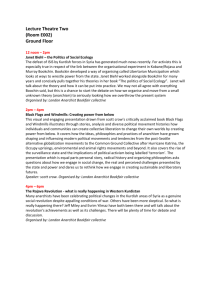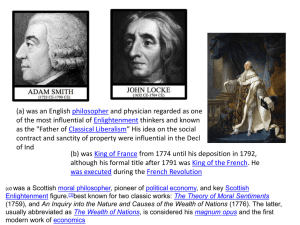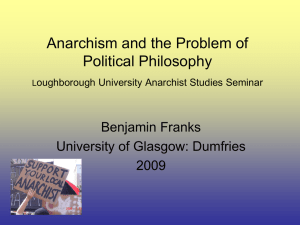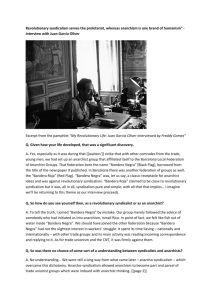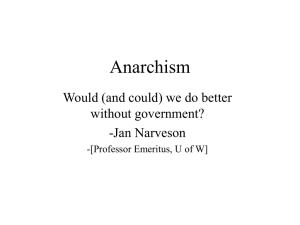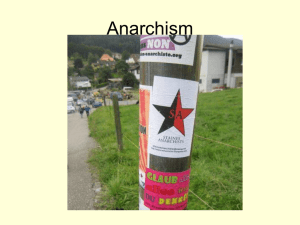Anarchism, a graduate course
advertisement
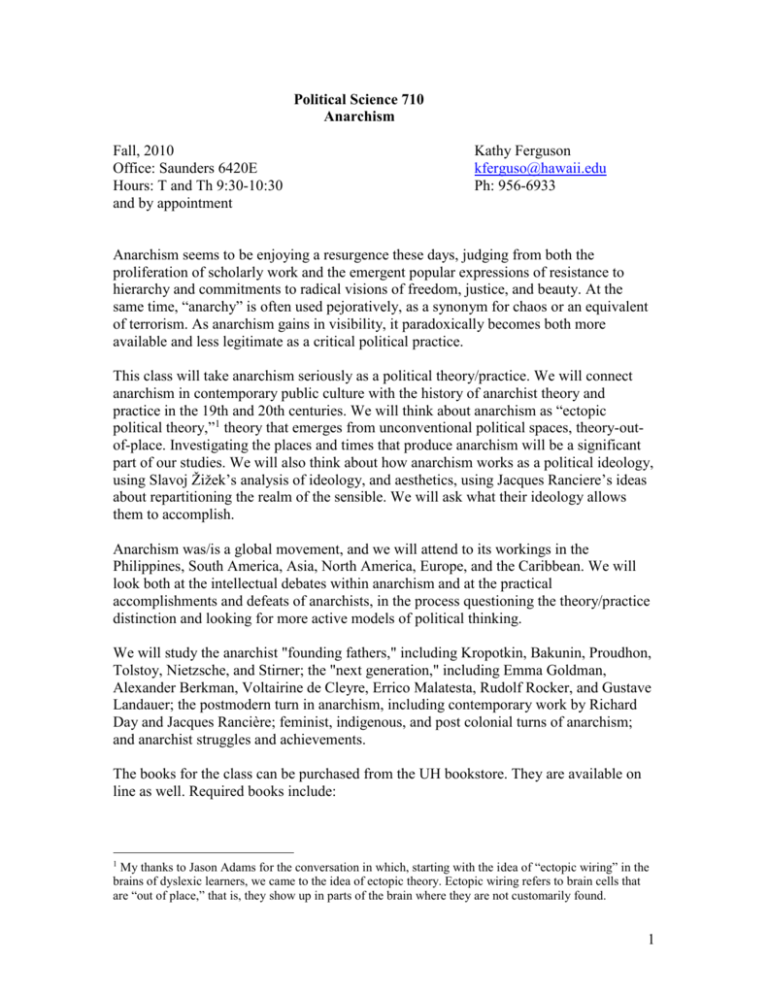
Political Science 710 Anarchism Fall, 2010 Office: Saunders 6420E Hours: T and Th 9:30-10:30 and by appointment Kathy Ferguson kferguso@hawaii.edu Ph: 956-6933 Anarchism seems to be enjoying a resurgence these days, judging from both the proliferation of scholarly work and the emergent popular expressions of resistance to hierarchy and commitments to radical visions of freedom, justice, and beauty. At the same time, “anarchy” is often used pejoratively, as a synonym for chaos or an equivalent of terrorism. As anarchism gains in visibility, it paradoxically becomes both more available and less legitimate as a critical political practice. This class will take anarchism seriously as a political theory/practice. We will connect anarchism in contemporary public culture with the history of anarchist theory and practice in the 19th and 20th centuries. We will think about anarchism as “ectopic political theory,”1 theory that emerges from unconventional political spaces, theory-outof-place. Investigating the places and times that produce anarchism will be a significant part of our studies. We will also think about how anarchism works as a political ideology, using Slavoj Žižek’s analysis of ideology, and aesthetics, using Jacques Ranciere’s ideas about repartitioning the realm of the sensible. We will ask what their ideology allows them to accomplish. Anarchism was/is a global movement, and we will attend to its workings in the Philippines, South America, Asia, North America, Europe, and the Caribbean. We will look both at the intellectual debates within anarchism and at the practical accomplishments and defeats of anarchists, in the process questioning the theory/practice distinction and looking for more active models of political thinking. We will study the anarchist "founding fathers," including Kropotkin, Bakunin, Proudhon, Tolstoy, Nietzsche, and Stirner; the "next generation," including Emma Goldman, Alexander Berkman, Voltairine de Cleyre, Errico Malatesta, Rudolf Rocker, and Gustave Landauer; the postmodern turn in anarchism, including contemporary work by Richard Day and Jacques Rancière; feminist, indigenous, and post colonial turns of anarchism; and anarchist struggles and achievements. The books for the class can be purchased from the UH bookstore. They are available on line as well. Required books include: My thanks to Jason Adams for the conversation in which, starting with the idea of “ectopic wiring” in the brains of dyslexic learners, we came to the idea of ectopic theory. Ectopic wiring refers to brain cells that are “out of place,” that is, they show up in parts of the brain where they are not customarily found. 1 1 Paul Avrich, The Modern School Movement: Anarchism and Education in the U.S. (AK Press: 2006). Allan Antliff, Anarchy and Art: From the Paris Commune to the Fall of the Berlin Wall (Arsenal Pulp Press: 2008). Benedict Anderson, Under Three Flags: Anarchism and the Anti-Colonial Imagination (Verso: 2006). Marshall Sahlins, The Western Illusion of Human Nature (Prickly Paradigm Press, 2008). James C. Scott, The Art of Not Being Governed: An Anarchist History of Upland Southeast Asia (Yale University Press 2009). Lucien van der Walt and Michael Schmidt, Black Flame: The Revolutionary Class Politics of Anarchism and Syndicalism (AK Press, 2009). There are also several essays and excerpts of books on our class website in Laulima. Class schedule: 8/26: Introduction 9/2: No class: anarchists will be gathering at the APSA Please use this time to do four things: 1. Read the large and very informative book Black Flame, to get an overview of global anarchism especially as it connects with labor. 2. Write one post in our discussion site on Laulima about something you found particularly interesting, odd, provocative, or in some way got your attention in this global account. 3. Peruse one or more of the excellent websites devoted to anarchism. Some excellent examples include: http://dwardmac.pitzer.edu/ANARCHIST_ARCHIVES/index.html http://en.wikipedia.org/wiki/Anarchism http://www.geocities.com/CapitolHill/1931/secAint.html 4. Write one post on Laulima about something you have found interesting, etc about the website you explored. The Laulima website: https://laulima.hawaii.edu/portal Please post by Sept 7 so we have time to read each other’s ideas before our next class. Please read each other’s ideas before class on Sept 9. 9/9: Creating space for anarchism Reading: Sahlins, The Western Illusion of Human Nature Ferguson, “Anarchist Counterpublics” (handout in class) Van der Walt and Schimdt, Black Flame 9/16: Anarchist education Reading: Avrich, The Modern School Movement 2 9/23: Founders: Proudhon, Bakunin, Kropotkin Reading: Kropotkin, Mutual Aid (excerpts) and “Anarchism,” Proudhon, Selected Writings (excerpt) (on website) Bakunin, Bakunin on Anarchy and Selected Writings (excerpts) (on website) 9/30: Founders: Nietzsche, Stirner, Tolstoy Reading: Nietzsche, “On Truth and Lie in an Extramoral Sense,” and excerpts from The Genealogy of Morals and The Will to Power (on website) Stirner, The Ego and Its Own (excerpt) (on website) Tolstoy, “Government Is Violence,” and “The Kingdom of God is Within You,” (excerpts) (on website) (note: a reading by William Godwin is in the same document, but I’m not asking you to read it.) 10/7: Next Generation: The Haymarket Martyrs, Goldman and Berkman Reading: One of the speeches of the Haymarket Martyrs; you can find them at http://www.marxists.org/subject/mayday/articles/speeches.html Berkman, The ABC of Anarchism and Prison Memoirs of an Anarchist (excerpts) (on website) Goldman, “Anarchism: What It Really Stands For,” and “The Traffic in Women,” (from Anarchism and Other Essays) (on website) 10/14: Next Generation: Rocker, de Cleyre, Landauer, and Malatesta Reading: Landauer, For Socialism (excerpt) (on website) Rocker, Anarcho-Syndicalism and Nationalism and Culture (excerpt) (on website) Malatesta, “Anarchy” (excerpt) (on website) De Cleyre, “They Who Marry Do Ill” and “Anarchism and American Traditions” 10/21 and 10/28: No class. I will be attending the Association for Political Theory Conference and giving a talk at University of Michigan. Please do four things with this time: 1. See one of the films available to us about anarchism or a particular anarchist. These include the following films which Laurie is holding for our use. Please pick the film up from her and take it back when you are done: “V for Vendetta” “Free Voice of Labor” “Anarchism in America” “Into the Fire: American Women in the Spanish Civil War” There are also several films in Wong AV in Sinclair Library that are pertinent: “Anarchist Guest: Emma Goldman” or “Emma Goldman: An Exceedingly Dangerous Woman” “In Search of History: The True Story of Sacco and Vanzetti” 3 Or, feel free to search around and find another film about some aspect of anarchism. 2. Write a Laulima post about the film you saw – tell us briefly what the film was about, for those who haven’t seen it, and then discuss one or two aspects of the film that particularly interested you. You might think about the point of view of the film on anarchism; the filmic practices by which the film operates; the historical ground it covers; the emotional impact it generates or tries to generate; etc. 3. Identify at least one example of contemporary anarchism, anarchist-like, or anarchistfriendly practices in the world. What are they trying to accomplish, how do they understand themselves and their world, what sorts of challenges do they face, how do they respond to those challenges? What do you think of their ideas and accomplishments? Examples could include organizations like: AK Press (a San Francisco publisher) Mondragon (a collective in Spain) Green Anarchy: A Journal of Desire Armed http://www.greenanarchy.org/index.php?action=viewlibrary Anarchism Music Anarchist Action Network Anarchists Against the Wall 4. Please post your thoughts on Laulima by November 2, so we all have time to read them before the next class. Please read all the posts before class on Nov 4. 11/4: Anarchism and anticolonial struggles Reading: Anderson, Under Three Flags 11/11: Veterans Day- no class 11/18: Anarchism and precolonial struggle Reading: James Scott, The Art of Not Being Governed 11/25: Thanksgiving 12/2: Art and imagery Reading: Antliff, Anarchy and Art 12/9: Anarchism, postmodernity, and indigeneity Reading: Taiaiake Alfred, Wasáse (excerpt) (on Laulima) Richard Day, Gramsci is Dead (excerpt) (on Laulima) Jacques Rancière, “Ten Theses on Politics” (on Laulima) 4 Projects and Presentations: Each student has the task of doing 3 projects and making 2 brief presentations in class. These presentations must be concise and well-organized, in order to allow other students to benefit from them and to have enough time for all students to present. Project I: Each student will take primary responsibility for one of the “founders.” You will make a brief presentation to the class on your “founder” and his contributions to anarchism. You are asked to read all the founders assigned for that week, but to concentrate most on “your” founder. Project II. Each student will take primary responsibility for one of the “next generation” thinkers. You will again make a brief presentation in class on your “next generation” anarchist and his/her contributions to anarchism. Again, you are asked to read all the anarchists assigned for that week, but to concentrate most on “your” thinker. Project III. Each student has the task of finding some kind of anarchism happening today – these can take the form of activist groups, websites, academic texts, pamphlets, artistic work, publishing houses, cooperatives, etc. Each student will post his/her findings on Laulima for class discussion. It is not particularly important whether the people you are looking at define themselves as anarchists; they may or may not do so; you are looking at what they say and do in light of anarchist ideas and histories, looking for significant convergences. Written work. Options for written work include: 1. One long paper: A seminar paper (which can double as a draft of a dissertation chapter, MA paper/thesis, or dissertation proposal) making use of a significant amount of the literature discussed in class. The paper should be about 20-25 pages and should use at least 2 or 3 of our class readings in a robust manner. This is a good choice for students who are aiming at a conference presentation and/or journal article, or those for whom this class can help generate a dissertation proposal or chapter. 2. Two shorter papers: One papers on the “founder” and another on the “next generation” anarchist thinker you selected to study (about 10 pages each). 3. Four response papers: Four short papers that reflect on and talk back to 4 (or more) of the books we are reading: Antliff, Avrich, Anderson, Scott, Sahlins, van der Walt and Schmidt. (about 5 pages each) Please come to my office and speak with me about your ideas for your paper. Brief Bibliography The “founders” include: 1. William Godwin, The Anarchist Writings of William Godwin 2. Michael Bakunin, The Political Philosophy of Bakunin (compiled and edited by G.P; Maximoff); Michael Bakunin: Selected Writing (edited by Arthur Lehning 5 3. Max Stirner, The Ego and Its Own 4. Peter Kropotkin, Mutual Aid, Kropotkin, Fields, Factories and Workshops Tomorrow (edited by Colin Ward); Kropotkin, The Conquest of Bread 5. P.J. Proudhon, Selected Writings of P.J. Proudhon (edited by Steward Edwards; translated by Elizabeth Fraser) 6. Leo Tolstoy, Confession; Tolstoy, What Then Must We Do? Tolstoy, The Kingdom of God is Within You 7. Frederick Nietzsche, The Genealogy of Morals, The Will to Power, Thus Spoke Zarathustra The “next generation” includes: 2. Emma Goldman, Anarchism and Other Essays; Goldman, Living My Life; Red Emma Speaks (Alex Kates Shulman, ed) 3. Alexander Berkman, What is Anarchism? Berkman, Prison Memoirs of an Anarchist 4. Voltairine de Cleyre, Exquisite Rebel (edited by Sharon Presley and Crispin Sartwell); The Voltairine de Cleyre Reader (edited by A.J. Brigati); An American Anarchist: The Life of Voltarine de Cleyre (Paul Avrich) 5. Errico Malatesta, At the Cafe: Conversations on Anarchism 6. Rudolf Rocker, Anarcho-Syndicalism: Theory and Practice; Rocker, Nationalism and Culture; Rocker, Anarchism and Anarcho-Syndicalism 7. Gustav Landauer, Anarchism in Germany and Other Essays 8. The Haymarket Martyrs: Haymarket Scrapbook (edited by Dave Roediger and Franklin Rosemont); James Green, Death in the Haymarket: A Story of Chicago, the First Labor Movement, and the Bombing that Divided Gilded Age America; Paul Avrich, The Haymarket Tragedy; Bernard Kogan, ed., The Chicago Haymarket Riot: Anarchy on Trial 6
